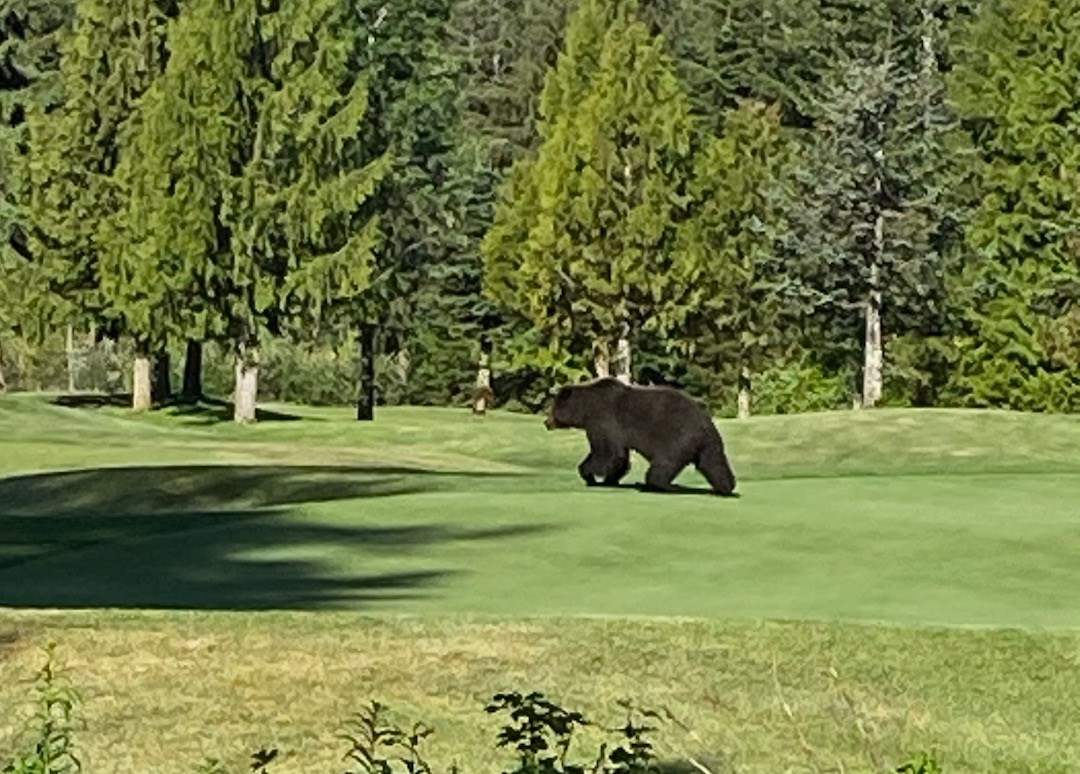The Whistler Half Marathon’s official tagline, “Immersed in Nature,” reaches its peak with a close encounter with a 300-pound female grizzly bear. Recent reports from the RCMP and the BC Conservation Officer Service (COS), along with feedback from the public at Rainbow Park, informed event organizer Dave Clark and his team about the bear’s presence in the valley.
They exercised their customary caution by pre-riding the track and searching for tracks and scat. Clark claims that up until the morning of Saturday, June 3, when the bear entered the Fairmont golf course, the risk level appeared to be well within typical bounds.
Unexpected Company
According to Clark, based on days of earlier observation, the COS was comparatively indifferent by the sow’s behavior. But an audible had to be called as it drew near the Valley Trail.
Fortunately, no other incidents occurred during the race as the bear was safely captured and transported by COS and RCMP officers.
Whistler resident Torren Davis, who won the bronze in the 30-kilometer category, was already familiar with the course from previous competitions. He initially felt perplexed by the sudden detour through Blackcomb Greens, but neither he nor the fellow runners he spoke with spotted the bear. Looking back, Davis believes that Dave Clark and his team did an excellent job altering the course while maintaining its overall length and topography.
Close Encounter with Grizzly Bear Adds Excitement to Whistler Half Marathon
The Half Marathon has dealt with black bears and other animals in the general area of the race before, but a grizzly bear has never been an issue. Since moving to Whistler more than 20 years ago, Clark cannot think of another year in which the valley saw several reports of grizzly sightings. Whether it’s a bear or a deer, the objective has always been to reduce confrontations with local wildlife.
Additionally, Clark and his teammates work to inform runners about wilderness safety. Check to see if any cubs are nearby. When a bear is in your path, your safety and the bear’s safety come before achieving a certain race time.
We simply try to the best of our abilities since, at the end of the day, we are dealing with nature’s unpredictable forces.
Additionally, Clark gave recognition to the volunteers who give of their time year after year to make the Half Marathon successful—and not just because on Saturday they prevented a potential wildlife catastrophe. He extols the virtues of volunteering in general and works to create an environment that is welcoming to individuals who give freely of their time.
A Spirit Of Exploration
The four events that made up the Whistler Half Marathon featured a lot of talented athletes. The 30-kilometer race was won by John Dean of Squamish, who finished in a time of 2 hours, 8 minutes, and 21 seconds. Vincent Pagot of Chilliwack (2:11:19) and Davis (2:12:59) joined him at the podium.
Australian native Davis, who is from Queensland, won the 20-29 age division and beat his previous personal record by more than 10 minutes.
Carley Gering from Victoria holds the title of the fastest woman over 30 kilometers with a time of 2 hours, 28 minutes, and 37 seconds. Following closely behind is Samantha van Diemen from Kamloops, finishing in 2 hours, 35 minutes, and 6 seconds, and Jeanelle Hazlett from Sechelt, completing the race in 2 hours, 39 minutes, and 12 seconds.
In the 5-kilometer race, Ellis Gray, a Vancouverite, emerged as the victor with a time of 19 minutes and 20 seconds, surpassing Jamie Burke (21 minutes and 4 seconds) who secured the second position. Local athlete George Hallewell claimed the bronze with a time of 21 minutes and 16 seconds. Joanna Hanson from Whistler finished the race in 24 minutes and 7 seconds, narrowly ahead of Maelle Hetherington from Brackendale (24 minutes and 20 seconds) and Celia Munoz from Vancouver (25 minutes and 17 seconds).
Volunteers Help Prevent Potential Wildlife Disaster
Nicholas Lightbody from Victoria clinched the victory in the half-marathon with an impressive time of 1 hour, 18 minutes, and 18 seconds. Kris Warkentin from Abbotsford secured second place, finishing in 1 hour, 20 minutes, and 0 seconds, closely followed by Nicholas Marty from Vader, Washington, who claimed third place with a time of 1 hour, 20 minutes, and 18 seconds.
The fastest female participant in the half-marathon was Catrin Jones from Victoria, crossing the finish line in 1 hour, 31 minutes, and 4 seconds. Marilyn Arsenault finished in second place with a time of 1 hour, 35 minutes, and 55 seconds, and Marina Lovell secured third place with a time of 1 hour, 39 minutes, and 15 seconds.
In the 10-kilometer race, David Jackson from Abbotsford emerged as the winner, completing the race in 37 minutes and 49 seconds. Mantas Jarusevicius from Richmond took second place with a time of 39 minutes and 3 seconds, while Xavier Gilbert from Quebec City secured third place with a time of 40 minutes and 45 seconds. In the women’s category, Hanna Stoddart from Cumberland claimed the first position, finishing in 45 minutes and 46 seconds, followed by Madeline Wiseman from Vancouver in second place with a time of 45 minutes and 46 seconds, and Tracy Dabbs from Vancouver in third place with a time of 46 minutes and 49 seconds.
Athletes Impress at Whistler Half Marathon
Individual race performances were obviously eclipsed this past weekend by grizzly bear talk. The majority of athletes maintained their composure throughout the remarkable turn of events, and Clark believes that their unusual visitor brought a special touch to the weekend’s celebrations.
“You know why people travel to Whistler—for adventure. No matter how that adventure might appear,” he suggested. I believe that this grizzly bear’s singularity added a dimension to the experience that neither we nor anyone else could have foreseen.
The grizzly bear’s presence did not instill fear, but rather elicited a sense of connection to nature among the people who embarked on adventures.




